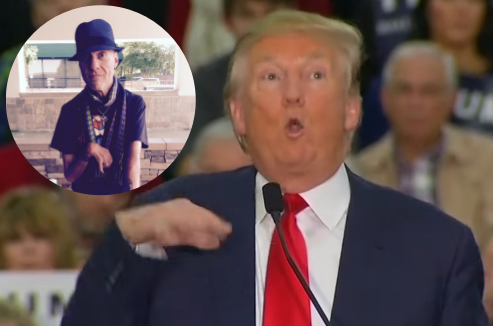Notes from Trumpland ~ The Boy Who Cries Wolf and Gets Away With It
 Tuesday, January 10, 2017 at 8:53PM
Tuesday, January 10, 2017 at 8:53PM The Boy Who Cried Wolf, one of Aesop’s fables, is a widely known morality tale in the Western world (to read various version see Fables of Aesop). It’s a fable about lying in general and patterns of lying in particular. It raises the vexed question: When does someone who lies become a liar? It describes the consequences of lying and being a liar. In one version the shepherd boy’s sheep are eaten by the wolf and in another the boy himself is also eaten. The Greek version of the fable ends with the moral: “this shows how liars are rewarded: even if they tell the truth, no one believes them.”
While we can debate endlessly about whether or not a particular utterance is a lie, we do agree that there is something we recognize as truth and something we recognize as falsehood. In most cultures truth-telling is considered to have prima facie value, which is to say that truth-telling is good in and of itself, needing no further justification. This prima facie assumption, the ability to distinguish between a truth and a falsehood, the willingness to pass judgment on those who lies, the willingness to hold the liar accountable for their words and actions, all depends on an agreed and shared understanding of what is necessary for human beings to live together in social organizations. It depends on our agreed understanding of what human reality actually is. Remove that understanding, and a language to speak of that understanding, and we destroy our moral and ethical foundation.
Of course, it is all much more complicated than this. We all lie (action) from time to time, but most of us are not pathological liars (character). While sometimes we get away with it (not eaten by a wolf, for example), most of the time we know we have done something wrong. A situational ethicist would interpret Aesop’s fable differently than a duty/consequence ethicist who would interpret the fable differently from a virtue/character ethicist. There are a zillion books written about morality and ethics, but here I want to focus on the relationship between politics, truth, falsehood, and our agreed reality. (If you are interested in exploring the world of ethics I think Ethics in Star Trek’s Delta Quadrant is a quick and, hopefully, enjoyable way to do so.)
 Joseph GoebbelsJoseph Goebbels, Hitler’s propaganda chief, famously said:
Joseph GoebbelsJoseph Goebbels, Hitler’s propaganda chief, famously said:
If you tell a lie big enough and keep repeating it, people will eventually come to believe it. The lie can be maintained only for such time as the State can shield the people from the political, economic and/or military consequences of the lie.
It’s a disturbing, by nonetheless, interesting statement. First, it recognized that the State, or its representative, is indeed telling a lie. Second, the success of the lie is grounded in its audacity and the State’s ability to “shield” people from its consequences. One gets the impression that Goebbels was speaking about things like justifications for conducting a war or denying the reality of the Holocaust. I think also Goebbels is speaking about long term deceptions, not to be revealed in even the distant future. However, he seems not to be denying the reality that there is truth and there is falsehood. The people come to believe in the lie’s truth, but Goebbels, the State, nonetheless knows what is the lie and what is the truth.
It’s not difficult to imagine that Trump, an apparent admirer of some of Hitler’s speeches (a little bedside reading - see Mother Jones) , might also admire Goebbels’s claim, but there are differences between the two men. While Trump can tell huge lies, he does not seem to be interested in the long view. His lies are blatantly opportunistic and for the moment. For example, during the campaign he said over and over again that the election was rigged. However, after he won he said: “now I don’t say it because I won. Now I don’t care.” During the election campaign, fact checking organizations siting real evidence reported that Trump lied every three to five minutes (see Politicususa and Politico). He’s the boy who cries wolf with no fear of consequences. He exposes his own lies with a casual ease, obviously feeling no necessity to “shield” people from the consequences of his lies nor fearing there will be any costs he himself might have to face. So far, he has been right.
 Trump’s use of lying is bold and utterly without embarrassment. At the Golden Globes Meryl Streep called out Trump on his mockery of the New York Times Reporter Serge F. Kovalevski who has arthrogryposis (see New York Times). Of course Trump denied ever having done such a thing even though he was seen by millions doing just that (see CNN). His ability to continue lying even as evidence to the contrary is available to the country is ominous. At some level he is attempting, perhaps assuming, he can define reality to his own liking and benefit. In Trumpland there is no objective truth and falsehood. This is not hyperbole.
Trump’s use of lying is bold and utterly without embarrassment. At the Golden Globes Meryl Streep called out Trump on his mockery of the New York Times Reporter Serge F. Kovalevski who has arthrogryposis (see New York Times). Of course Trump denied ever having done such a thing even though he was seen by millions doing just that (see CNN). His ability to continue lying even as evidence to the contrary is available to the country is ominous. At some level he is attempting, perhaps assuming, he can define reality to his own liking and benefit. In Trumpland there is no objective truth and falsehood. This is not hyperbole.
Scottie Nell Hughes, a Trump surrogate and supporter, made a remarkable claim. She said on a the Diane Rehm Show:
Facts aren’t really facts. If we believe something to be true it is true. So when Trump says 3 million people voted illegally for Clinton, if he believes it and his followers believe it (I guess because he said it) than it is true…And so one thing that has been interesting this entire campaign season to watch, is that people that say facts are facts—they're not really facts. Everybody has a way—it's kind of like looking at ratings, or looking at a glass of half-full water. Everybody has a way of interpreting them to be the truth, or not truth. There's no such thing, unfortunately, anymore as facts (to listen to her comments go to Diane Rehm Show starting at the time marker 14.40).
She is saying, reminiscent of Goebbels, that if Trump says it and believes it, it is true. If Trump’s supporters believe it, it is true. What Hughes is claiming is that there no longer exists a shared agreed understanding of truth and falsehood, there is no longer such a thing as a shared understanding of reality. Reality, truth, falsehood are what Trump says they are. This is the man who will run the United States government and control the country’s military.
Trump has a pattern of lying that long ago crossed over the invisible line separating a person who occasionally lies and a person who is by their character a liar. Does Trump actually believe this or is it a strategy? Does he actually know that there is no evidence that three million illegal votes for Clinton, or does his own claim that there were shield him from the truth? I don’t know, but either way, we cannot let it stand. We need to continually call him on his lies, and then call him on his denials. We cannot let Trump and his gang define reality.
Copyright © 2017 Dale Rominger
Reader Comments